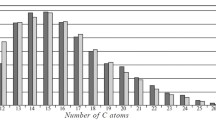Summary
-
1.
Under the conditions adopted, the thermal-oxidative treatment of alkanes or cyclanes does not form any sediment; the oxidation products remain dissolved in the fuel.
-
2.
Differences in chemical structure among paraffinic-naphthenic fractions of various fuels contribute to a differing degree of coagulation of the oxidation products that have formed, which in turn has an effect on the precipitation of sediment from the fuel.
-
3.
Blends of aromatic hydrocarbons with naphthenes form considerably less sediment upon oxidation than do analogous blends of aromatics with isoparaffins.
Similar content being viewed by others
Literature cited
E. M. Bushueva and I. E. Bespolov, Khim. i Tekhnol. Topliv i Masel, No. 8 (1963).
E. M. Bushueva and I. E. Bespolov, Khim. i Tekhnol. Topliv i Masel, No. 12 (1965).
Author information
Authors and Affiliations
Additional information
Translated from Khimiya i Tekhnologiya Topliv i Masel, No. 12, pp. 44–46, December, 1966.
Rights and permissions
About this article
Cite this article
Bushueva, E.M., Bespolov, I.E. Effect of alkanes and cyclanes on thermal-oxidative stability of jet fuels. Chem Technol Fuels Oils 2, 865–867 (1966). https://doi.org/10.1007/BF00731541
Issue Date:
DOI: https://doi.org/10.1007/BF00731541




